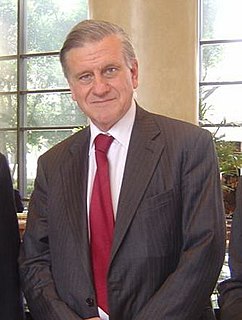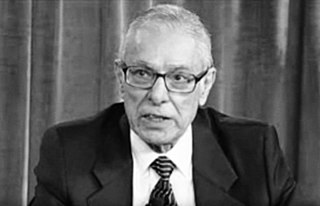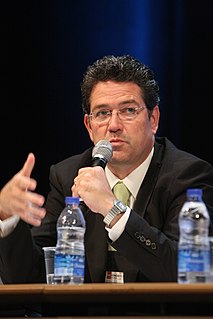Related Research Articles
Stephen E. Epstein is the Head of Translational and Vascular Biology Research at the MedStar Heart and Vascular Institute, MedStar Washington Hospital Center and Clinical Professor of Medicine at the Georgetown University School of Medicine.
Eugene Braunwald is an Austrian-born American cardiologist.

Michael Lesch was a Jewish American physician and medical educator who helped identify an important genetic disorder associated with retardation and self-mutilation. This disease is now known as the Lesch–Nyhan syndrome. In the mid-1960s when the syndrome was discovered, Lesch was a research associate working at the Laboratory of General and Comparative Biochemistry at the NIH National Institute of Mental Health in Bethesda, Maryland. William Nyhan, a pediatrician and biochemical geneticist, was his mentor. Lesch was 30 years old when he discovered the disease.

Moshe Yitzhak Gueron was an Israeli physician and researcher, innovator, scientist, medical educator, Professor of Cardiology at the Medical School for International Health at Ben-Gurion University of the Negev, a pioneer in the field of Cardiology. He founded and managed the Division of Cardiology in the Soroka Medical Center for 30 years. His research and clinical works gained broad international recognition. Gueron played a central role in developing global medicine, and he is mainly known for his work on the treatment of heart patients with cardiovascular manifestations of severe scorpion sting. Gueron was a protege of the late Prof. Noble O. Fowler, who invited him in 1958 to a University of Cincinnati fellowship in Cardiology.

Valentín Fuster Carulla, 1st Marquess of Fuster is a Spanish cardiologist.

A myocardial infarction (MI), commonly known as a heart attack, occurs when blood flow decreases or stops to the coronary artery of the heart, causing damage to the heart muscle. The most common symptom is chest pain or discomfort which may travel into the shoulder, arm, back, neck or jaw. Often it occurs in the center or left side of the chest and lasts for more than a few minutes. The discomfort may occasionally feel like heartburn. Other symptoms may include shortness of breath, nausea, feeling faint, a cold sweat or feeling tired. About 30% of people have atypical symptoms. Women more often present without chest pain and instead have neck pain, arm pain or feel tired. Among those over 75 years old, about 5% have had an MI with little or no history of symptoms. An MI may cause heart failure, an irregular heartbeat, cardiogenic shock or cardiac arrest.
Nicholas George Kounis is professor emeritus of cardiology in the University of Patras and scientific cardiology advisor at Saint Andrews State General Hospital Patras and at the Department of cardiology of University of Patras Medical School, Patras, Greece.

Electrocardiography in suspected myocardial infarction has the main purpose of detecting ischemia or acute coronary injury in emergency department populations coming for symptoms of myocardial infarction (MI). Also, it can distinguish clinically different types of myocardial infarction.

K. Srinath Reddy is the president of the Public Health Foundation of India and formerly headed the Department of Cardiology at All India Institute of Medical Sciences (AIIMS).

Francis Miller Fesmire was an American emergency physician and a nationally recognized expert in myocardial infarction. He authored numerous academic articles and assisted in the development of clinical guidelines on the standard of care in treating patients with suspected myocardial infarction by the American College of Emergency Physicians and the American Heart Association/American College of Cardiology. He performed numerous research investigations in chest pain patients, reporting the usefulness of continuous 12-lead ECG monitoring, two-hour delta cardiac marker testing, and nuclear cardiac stress testing in the emergency department. The culmination of his studies was The Erlanger Chest Pain Evaluation Protocol published in the Annals of Emergency Medicine in 2002. In 2011 he published a novel Nashville Skyline that received a 5 star review by ForeWord Reviews. His most recent research involved the risk stratification of chest pain patients in the emergency department.
Muhammad Hafizullah is a Pakistani Professor of cardiology who served as Vice Chancellor of Khyber Medical University (KMU) in Peshawar Chief Executive of Lady Reading Hospital and Head of Cardiology Department of Lady Reading Hospital. He is the Project Director of the Peshawar Institute of Cardiology and has contributed to national guidelines on thrombolysis, acute coronary syndrome, and ST elevation myocardial infarction developed by the Pakistan Cardiac Society.
Circulating endothelial cells (CECs) are endothelial cells that have been shed from the lining of the vascular wall into the blood stream. Endothelial cells normally line blood vessels to maintain vascular integrity and permeability, but when these cells enter into the circulation, this could be a reflection of vascular dysfunction and damage. There are many factors involved in the process of creating CECs, including: reduced interaction between the endothelial cells and basement membrane proteins, damaged endothelial cellular adhesion molecules, mechanical injury, decreased survival of cytoskeletal proteins, and inflammation.

James S. Forrester III is an American cardiologist. Born in Philadelphia, Pennsylvania, he received his medical training at the University of Pennsylvania, UCLA, and Harvard University. During the 1970s through 1990s, his research led to three major advancements in the practice of cardiology. Later in his career, he would return to UCLA, this time as a professor, while simultaneously being the Chief of the Division of Cardiology at Cedars-Sinai Medical Center. Forrester has published hundreds of papers and manuscripts dealing with the subject of cardiology, and is the recipient of numerous awards, including being the second person to ever receive the Lifetime Achievement Award of the American College of Cardiology in 2009.

Shahbudin Rahimtoola was a cardiologist based in Los Angeles, United States. He served as Distinguished Professor at the Keck School of Medicine, University of Southern California. Rahimtoola was credited for his contribution to two clinical syndromes namely the hibernating myocardium and 'prosthetic valve-mismatch'.
Gerd Heusch is a German physician, physiologist, and professor as well as chair of the Institute for Pathophysiology at the University of Essen Medical School.
Sekar Kathiresan MD is chief executive officer and co-founder of Verve Therapeutics. Verve is pioneering a new approach to the care of cardiovascular disease by developing single-course gene-editing therapies that safely and durably lower plasma LDL cholesterol in order to treat atherosclerotic cardiovascular disease.
Béla Merkely is a Hungarian interventional cardiologist and sports cardiologist, a university professor, director of Semmelweis University’s Heart and Vascular Centre and the current rector of Semmelweis University since 1 July 2018.

George (Rick) Stouffer M.D. is Chief of the Division of Cardiology at the University of North Carolina Medical Center., where he is a practicing interventional cardiologist. Stouffer was awarded the Ernest and Hazel Craige Distinguished Professorship of Medicine in 2018; prior to that he was the Henry A. Foscue Distinguished Professor of Medicine. Stouffer is also co-director of the McAllister Heart Institute. He is known for his research regarding inpatient ST elevation myocardial infarctions.

Dan Atar is a clinical cardiologist, researcher and professor. He is head of research at Oslo University Hospital, Div. of Medicine, and a full professor at the Institute of Clinical Sciences of the University of Oslo, Norway. He is Editor-in- Chief of the scientific journal Cardiology.

John A. Ambrose is an internationally renowned expert in coronary artery disease. He is one of the pioneers in acute coronary syndromes having published over 40 articles in the cardiology literature between 1985 and 2000 on their pathogenesis. He has also published extensively on cigarette smoking and cardiovascular disease. Working with his PhD candidate, Rajat Barua, utilizing a novel in vitro model, they described the effects of cigarette smoking on nitric oxide biosynthesis, endothelial function, and endothelial-derived fibrinolytic and antithrombotic factors. Their 2004 update on cigarette smoking and cardiovascular disease published in the Journal of the American College of Cardiology has been referenced over 2,100 times as of 2020. Ambrose is currently a Professor of Clinical Medicine at the University of California, San Francisco. He was also a Director of the Cardiac Catheterization Laboratory at Mount Sinai Hospital and received a National Leadership Award from the National Republican Congressional Committee.
References
- ↑ "Joseph S. Alpert". Library of Congress. Retrieved 3 January 2016.
- 1 2 3 "Joseph Alpert". University of Arizona. Retrieved 3 January 2016.
- ↑ "Editorial Board". American Journal of Medicine website. Retrieved 3 January 2016.
- 1 2 "Joseph Alpert: instrumental in defining MI". Cardiology Today. February 2008. Retrieved 3 January 2016.
- ↑ Brookes, Linda (26 October 2012). "The Third MI Definition: An Expert Interview With Joseph Alpert". Medscape. Retrieved 3 January 2016.